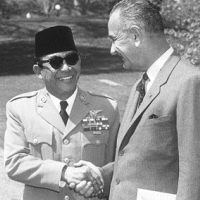Indonesia Rights Group Wants Obama to Release Secret Files on U.S. Role in Bloody ‘60s Purge
 Indonesia President Sukarno and Vice President Lyndon Johnson, 1961 (photo: Abbie Rowe, PhotoQuest/Getty Images)
Indonesia President Sukarno and Vice President Lyndon Johnson, 1961 (photo: Abbie Rowe, PhotoQuest/Getty Images)
By Matthew Pennington, Associated Press
WASHINGTON (AP) — The Indonesia that Barack Obama lived in as a child bore fresh scars from the darkest period in that country's modern history. Shortly before Obama's arrival in 1967, hundreds of thousands of people had been killed in a bloody anti-communist purge.
Now Indonesian human rights officials want Obama's help in addressing unanswered questions about the bloodshed 50 years ago. They are requesting the declassification of secret U.S. files that could shed light on how the killings were planned and the extent that the United States collaborated with Indonesia's military.
Despite nearly two decades of civilian rule, the prevailing account in Indonesia of those events remains the one planted by the military regime that swept to power after the killings, led by the dictator Suharto who ruled for 30 years. Indonesian text books portray it as a national uprising against a communist threat, and gloss over the deaths.
Joko Widodo, the first directly elected Indonesian president without links to Suharto, ran as a reformer who would look into episodes of military impunity, but since taking office in 2014, he has not pressed the issue due to opposition within his own government and the still-powerful military.
Indonesia's National Human Rights Commission in 2012 reported there was evidence that crimes against humanity were committed during the 1965-1966 crackdown, but the attorney general took no action.
Commissioner Muhammad Nurkhoiron met this week with State Department officials and has made a formal request to Obama that says the release of files from the CIA, the Defense Intelligence Agency and other agencies will help in "encouraging the Indonesian government to redouble its own efforts to establish the truth" and promote reconciliation.
"We need the U.S. to immediately release those documents to help our efforts," Nurkhoiron said in an interview. He said when Obama leaves office early next year, momentum for U.S. action could be lost.
Myles Caggins, a National Security Council spokesman, said it will review the commission's request. He said the administration supports the declassification of any relevant documents from the period which do not pose a national security risk. The U.S. has already released many documents related to the period, but has withheld others.
The killings began in October 1965 shortly after an apparent abortive coup in which six right-wing generals were murdered. Suharto, an unknown major general at the time, filled the power vacuum and blamed the assassinations on Indonesia's Communist Party, which was then the largest outside the Soviet Union and China, with some 3 million members. No conclusive proof of communist involvement in the coup has been produced.
In his 1995 best-selling memoir, "Dreams From My Father," Obama recounted how his mother, who had moved them to Jakarta after marrying an Indonesian, learned about the recent killings through "innuendo, half-whispered asides." In words that still ring true, Obama wrote: "The death toll was anybody's guess: a few hundred thousand, maybe; half a million."
At that time, the Vietnam War was intensifying, and Washington's fears of communist takeovers in Southeast Asia were running high. Previously declassified State Department documents indicate that the U.S. Embassy in Jakarta passed the names of dozens of Communist Party leaders to the Indonesian army. Redacted meeting notes from a National Security Council covert action committee that were declassified last month — the result of a 2004 freedom of information request from a U.S. historian — show that the U.S. endorsed "obstructive action" against the Communist Party.
The historian, Brad Simpson from the University of Connecticut, said the U.S. organized covert operations aiming to provoke a violent clash so the Indonesian army would crush the communists. Once the killings had started, the U.S. sent technical assistance and clear signals that it supported the killings, he said.
But Simpson said releasing more detailed information would likely make clearer that the primary responsibility for killings lay with the Indonesian military and state, and not the United States. It could shed light on the command and control structure of the Indonesian armed forces, who was actually carrying out the killings in particular places, and the degree of coordination that was involved between the Indonesian army and its civilian supporters and affiliates.
"The more we release, the less tenable will be the conspiracy theories about the U.S. role," Simpson said.
Thomas Blanton, director of the nongovernment National Security Archive, said the Obama administration has quite a good track record on declassifying documents for human rights accountability, as it did last October for Chile, revealing that former dictator Augusto Pinochet ordered the 1976 assassination of a Chilean diplomat.
But he said the U.S. was unlikely to act without a strong push from the Indonesian government, particularly as some of the documents being sought are closely guarded CIA operational files.
That appears unlikely, as the bloodshed of 50 years ago, which is believed to have caught up many with only tenuous communist links, remains a deeply sensitive topic in Indonesia.
Authorities have in some cases blocked public viewings of two recent Oscar-nominated documentaries by the filmmaker Joshua Oppenheimer, who tracked down former death squad members and found them unashamed, unrepentant and even willing to re-enact their brutal murders.
- Top Stories
- Unusual News
- Where is the Money Going?
- Controversies
- U.S. and the World
- Appointments and Resignations
- Latest News
- Musk and Trump Fire Members of Congress
- Trump Calls for Violent Street Demonstrations Against Himself
- Trump Changes Name of Republican Party
- The 2024 Election By the Numbers
- Bashar al-Assad—The Fall of a Rabid AntiSemite






Comments